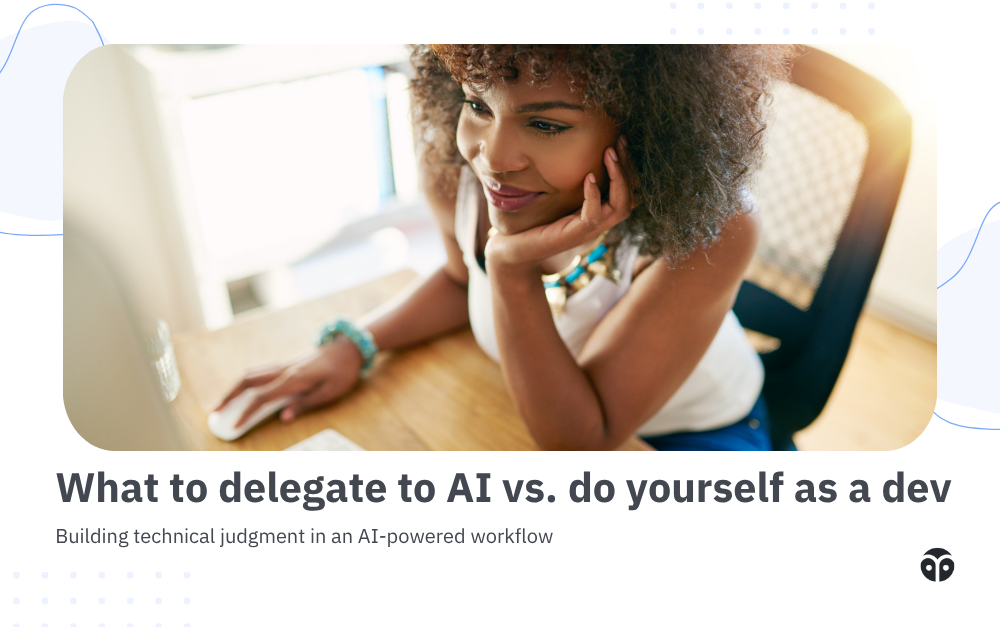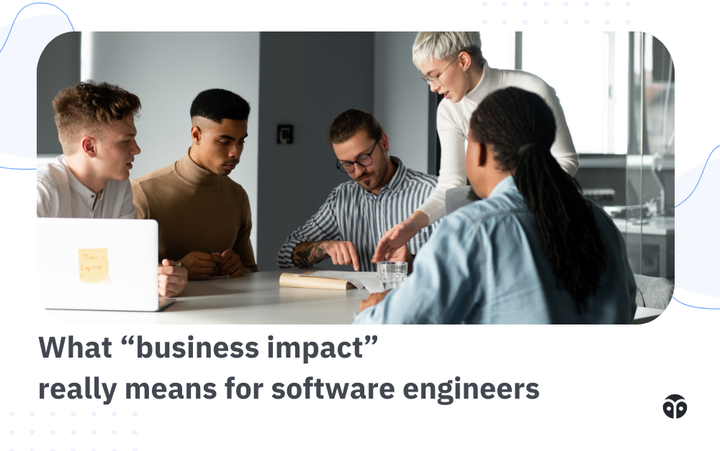What to delegate to AI vs. do yourself as a dev
Learn when to delegate to AI and when to take the wheel. A guide to building judgment in an AI-powered development workflow.

Across the industry, engineers are being told to use AI tools to write code, speed up development, and reduce grunt work. In theory, it’s a win-win: more time for complex thinking, less time doing what feels repetitive.
But in practice, it’s not that simple.
Delegating too much too soon can create technical debt or introduce bugs. Holding back completely slows you down. Navigating that tension between efficiency and control is the real skill.
That’s what this post is about: not how to use AI, but how to build the judgment that helps you decide when and where to bring it in.
What’s actually safe to delegate
There’s a category of tasks in software development that are well-defined, low-stakes, and time-consuming. These are ideal candidates for AI tools, not because the tasks are unimportant, but because they don’t demand deep context or critical thinking to get right.
Developers who’ve used AI consistently often start here:
- Scaffolding boilerplate. Setting up routes, structuring files, configuring dependencies. When the logic is repetitive and the structure is predictable, AI can speed things up without introducing risk.
- Writing basic unit tests. Especially for coverage in low-complexity areas. You’ll still need to write edge-case tests yourself, but AI can give you a baseline.
- Regex, CLI, and syntax lookups. These aren’t always worth memorizing. AI tools are good at pattern-based generation, and here, you can test and validate results quickly.
- Summarizing unfamiliar code. When onboarding to a new repo or module, AI can give a fast overview. You’ll still need to trace through the logic, but it helps flatten the ramp.
When you use AI in these parts of your workflow, you get more comfortable prompting, reviewing, and editing. That’s how confidence builds.
What still needs human judgment
AI tools are getting better. But they’re not reasoning through your product decisions or understanding your company’s architecture. There are parts of your job that still demand human-led thinking, especially when trade-offs are involved.
Here’s where delegation gets dangerous:
- System design decisions: AI can suggest a pattern, but it doesn’t know your team’s tech debt, performance needs, or long-term goals. Choosing between state machines, queues, or event-driven architecture isn’t a one-size-fits-all problem.
- Business-critical logic: Pricing calculations, permissions, and user data handling should be written, and understood, by humans. The risk of silent errors is too high.
- Security-sensitive code: AI can propose solutions that look secure, but often reuse flawed patterns from public codebases. You still need to audit anything touching auth, encryption, or data access.
- Code reviews and final decisions: AI can assist, but it won’t understand the intent behind the change. Code review is encompasses maintainability, team conventions, and alignment — not just whether the code runs.
In these areas, speed isn’t the goal, clarity is. If you don’t understand what the AI produced, you shouldn’t merge it.
The gray zone is where judgment matters most
Some tasks fall in between. They’re not risk-free, but they’re also not mission-critical. This is where the best developers treat AI like a sparring partner, not an answer engine.
Think of things like:
- Framework migrations
- SQL query generation
- Performance optimizations
- Internal documentation drafts
In each of these, AI can give you a solid starting point. But you need to pressure-test the output. Does the query match your schema? Will this optimization hold under load? Does the documentation match what the function actually does?
Treating these tasks as collaborative, where you prompt, get output, revise, and ask again, is how AI becomes useful without taking over.
A better mental model for AI as a dev
If you think of AI as a super-smart autocomplete, you’ll overtrust it. If you think of it as a static tool, you’ll underuse it. The better framing is this: AI is like a junior engineer who’s fast, confident, and occasionally wrong in very convincing ways.
That means your job isn’t just to generate or accept what it gives you. It’s to shape, direct, and review it.
Over time, you’ll start to notice patterns:
- When AI nails a problem out of the gate
- When you need to tweak the prompt to get something useful
- When it’s faster to write the code yourself
This judgment doesn’t come from reading documentation or taking a course. It comes from trying. Prompting, reviewing, editing, shipping. Then doing it again.
What it looks like to build this muscle
One of the fastest ways to get better at using AI in development is to apply it to things you’ve already written.
Take a piece of code you understand and ask the AI to refactor it. See what it changes. Ask why. If it made a good choice, great, you’ve learned something. If it missed something important, even better, you’ve built confidence in your own thinking.
This approach works because you’re not relying on AI to generate novel logic. You’re using it as a second set of eyes to suggest clarity, improvements, or alternatives. And because you already know what the code is supposed to do, you’re in a strong position to judge the output.
It also makes AI a part of your daily flow — something you use regularly, not something you reach for only when you’re stuck.
Delegation is a leadership skill
For senior developers and tech leads, how you model delegation for others matters.
Are you using AI to unblock yourself? Are you encouraging junior engineers to use it for early drafts? Are you cultivating a culture where reviewing AI-generated code is the norm and expected?
The best technical teams today aren’t replacing human thinking with AI. They’re making better use of human thinking because AI is taking care of the basics. But that only works when the team has good instincts about when to trust the tool and when to take over.
That instinct is what separates the teams who move fast with confidence from the ones who get bogged down in caution — or worse, build without realizing they’re introducing risk.
Delegation to AI helps you stay sharp
The most powerful thing about AI isn’t speed. It’s leverage.
But leverage only works when you apply it in the right places. Use AI where it saves time without reducing understanding. Skip it where it masks complexity or increases risk. And use it often enough to notice when that boundary starts to shift — because it will.
You don’t need to be perfect. You need to be thoughtful. Delegation isn’t about doing less work. It’s about choosing your work more intentionally.
That’s the kind of engineering mindset that doesn’t get replaced. It gets elevated.
Get holistic interview prep with Formation
The Formation Fellowship gives mid-level and senior engineering job seekers everything they need to land their dream roles — including personalized skill brush-ups, resume help, unlimited mock interviews with experienced software engineers and hiring managers from top-tier tech companies, career and negotiation support, and more.
If you’re having trouble navigating your job search on your own, apply here and get unconditional support from a team of engineering mentors, technical recruiters, career coaches, and more.



